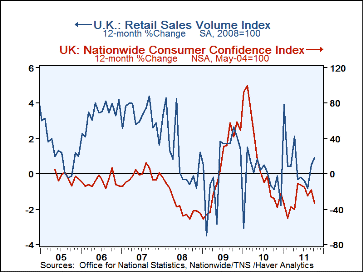 Global| Nov 17 2011
Global| Nov 17 2011UK Retail Sales Bounce As Consumer Confidence Sags
Summary
Retail sales or retail therapy? While Europe is weak and policies are contentious and the UK has been drawn into the backbiting as well...and as the UK consumer has been steadily losing confidence, perhaps as an observer of this [...]
 Retail sales or retail therapy?
Retail sales or retail therapy?
While Europe is weak and policies are contentious and the UK has been drawn into the backbiting as well...and as the UK consumer has been steadily losing confidence, perhaps as an observer of this process the UK consumer’s idea of remedy for all the malaise is retail therapy?
UK retail sales volume is up by 0.6% on the heels of a 0.5% gain in September. These two gains, one in the new quarter and on the other at the end of the old, help to boost retail real sales to a 4.6% rate of expansion in the first month of Q4 over the base of Q3.
While higher sales are good news they contrast sharply with the UK consumer’s feelings. The UK consumer, like the US consumer, is feeling worse and worse as he seems to be shopping more and more. Hence, I ask if this ‘retail therapy?’
I don’t know if this notion of retail therapy should be taken as a serious proposition or not. We do see disconnects between what consumers say and what they do at least in the short run. In fact the chart shows that the current disconnect is a lot like a similar confidence/spending divergence we saw earlier this year. On the chart we plot Yr/Yr percentage changes in real retail sales against the level of the Nationwide consumer confidence index. The current divergence in the two trends is significant. Still, there is nothing unique in this episode.
We probably do not need any special reason to explain why confidence and spending are going in opposite directions right now. These things happen. We can see that we get disconnects and re-connects. But the level of the consumer confidence index does seem to point the way for what ultimately happens with retail sales. That’s the bad news. The continued weakness- and new weakening- in confidence suggests that the spending splurge - whatever its cause - is not likely to last. Indeed, consumers are sometimes forced to spend money that they might not want to as the school year restarts or as long held durable goods wear out. Sometimes the consumer simply does not have much control over these things. The confidence reading does seem to shift to indicate real changes in the spending trend. What confidence is doing now is not encouraging for the future of spending despite the recent spending results.
As we look at the relationship between spending and confidence we do observe that sometimes the spending trends shift ahead of the confidence trend. In 2009 and in late 2010/early 2011 the spending trend turned ahead of the shift in the confidence metric. But we have to ask ourselves if given the rest of what we know about the UK economy and its connection to Europe is that sort of a shift likely to continue? Is that a reasonable expectation? I don’t think you can answer ‘yes’ to that question with any degree of authority. That leaves us with the weak trend in confidence to call the tune for the future.
| UK Real and Nominal Retail Sales | ||||||||
|---|---|---|---|---|---|---|---|---|
| Nominal | Oct-11 | Sep-11 | Aug-11 | 3Mo | 6Mo | 12Mo | YrAgo | Q-2-D |
| Retail Total | 0.7% | 0.8% | -0.1% | 6.0% | 2.2% | 5.4% | 2.2% | 7.8% |
| MV and Parts | ||||||||
| Food Bev & Tobacco | 0.4% | 0.6% | 0.4% | 5.5% | 1.1% | 5.4% | 1.9% | 5.5% |
| Clothing footwear | 1.3% | -0.2% | -0.3% | 3.3% | -0.2% | 2.6% | 5.7% | 6.6% |
| Real | ||||||||
| Retail Volume:all | 0.6% | 0.5% | -0.5% | 2.4% | -0.4% | 0.9% | -0.9% | 4.6% |
| Memo:UK HICP | 0.2% | 0.9% | 0.4% | 6.0% | 4.2% | 5.0% | 3.3% | 5.6% |
Robert Brusca
AuthorMore in Author Profile »Robert A. Brusca is Chief Economist of Fact and Opinion Economics, a consulting firm he founded in Manhattan. He has been an economist on Wall Street for over 25 years. He has visited central banking and large institutional clients in over 30 countries in his career as an economist. Mr. Brusca was a Divisional Research Chief at the Federal Reserve Bank of NY (Chief of the International Financial markets Division), a Fed Watcher at Irving Trust and Chief Economist at Nikko Securities International. He is widely quoted and appears in various media. Mr. Brusca holds an MA and Ph.D. in economics from Michigan State University and a BA in Economics from the University of Michigan. His research pursues his strong interests in non aligned policy economics as well as international economics. FAO Economics’ research targets investors to assist them in making better investment decisions in stocks, bonds and in a variety of international assets. The company does not manage money and has no conflicts in giving economic advice.
More Economy in Brief
 Global| Feb 05 2026
Global| Feb 05 2026Charts of the Week: Balanced Policy, Resilient Data and AI Narratives
by:Andrew Cates






